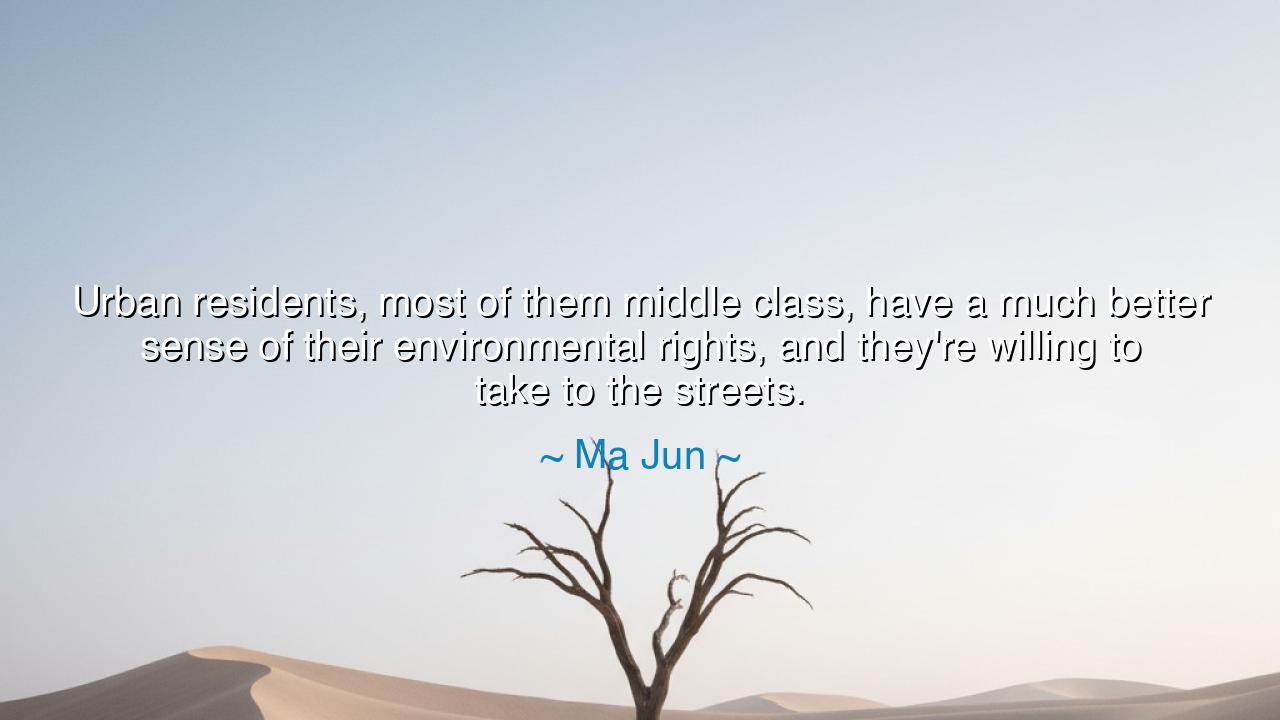
Urban residents, most of them middle class, have a much better
Urban residents, most of them middle class, have a much better sense of their environmental rights, and they're willing to take to the streets.






Hear the fiery words of Ma Jun, spoken as both observation and prophecy: “Urban residents, most of them middle class, have a much better sense of their environmental rights, and they're willing to take to the streets.” In this declaration lies the awakening of the people, the stirring of a class long lulled by comfort into now recognizing the peril of poisoned skies and waters. He tells us that the guardians of change are not only the poor, who suffer first, but also the middle class, who, armed with knowledge and stability, rise to demand justice for themselves and for the earth.
The heart of his message rests upon environmental rights. These are not luxuries to be granted, but fundamental truths—that every man, woman, and child has the right to breathe clean air, to drink safe water, to walk upon soil that does not sicken them. When Ma Jun says urban residents are aware of these rights, he speaks of an awakening: people no longer accept pollution as the cost of progress, nor silence as the price of survival. They claim their birthright, and in claiming it, they transform grievance into power.
History bears witness to the truth of his words. In China, protests erupted in cities like Dalian and Ningbo when chemical plants threatened to pollute their air and waters. These were not peasants alone, but office workers, students, shopkeepers, and professionals—ordinary citizens of the middle class who poured into the streets with banners and chants, demanding the protection of their health. Their courage forced governments to pause, to listen, to act. Thus, Ma Jun reminds us that when knowledge spreads and voices unite, even the most entrenched powers cannot ignore the cry of the people.
The wisdom here is that the middle class carries a unique strength. They have the education to recognize the dangers of unchecked industry, the resources to organize, and the confidence to demand accountability. In ages past, great revolutions often ignited when the middle ranks of society, once content, realized their rights were being trampled. So too, in this age, environmental revolutions may be led by those who have tasted prosperity but refuse to accept its poison. Their power lies not in violence but in numbers, and in the moral clarity of their cause.
Consider, too, the story of the Clean Air Act in the United States. In the 1960s and 1970s, it was not only scientists but ordinary urban citizens, choking on smog in Los Angeles and New York, who raised their voices. Their protests and petitions pushed lawmakers to act, and the result was sweeping legislation that saved countless lives. Here again, the streets became the arena of justice, and the voice of the people turned into law. This is the very spirit Ma Jun evokes: the willingness of citizens to defend what is sacred by lifting their voices in unity.
The lesson is clear and stirring: rights are not gifts handed down from rulers—they are truths claimed by the people. If you wait for those in power to act, you may wait forever; but if you rise, if you march, if you fill the streets with the sound of your demand, then change begins. Environmental justice belongs to those who are brave enough to insist upon it, and the middle class, with its numbers and awareness, must not shrink from this responsibility.
Therefore, children of tomorrow, remember the teaching of Ma Jun: know your rights, and defend them. Do not accept poisoned air or tainted water as the price of progress. Stand with your neighbors, raise your voice, and take to the streets if need be. For when the people rise together in defense of the earth, they not only protect their own lives—they preserve the inheritance of generations yet to come. And this is the highest act of citizenship: to guard both human dignity and the living world that sustains it.






AAdministratorAdministrator
Welcome, honored guests. Please leave a comment, we will respond soon